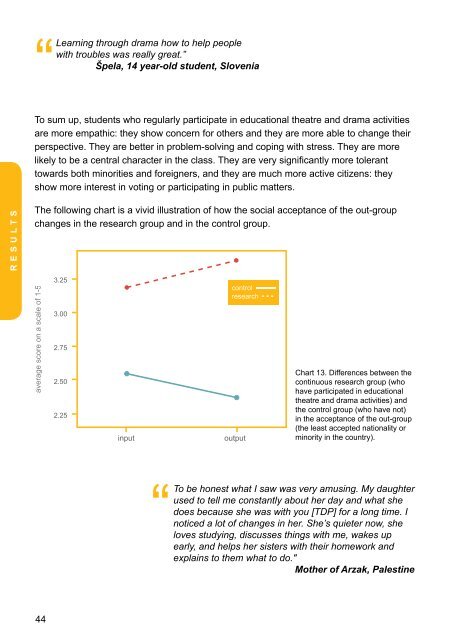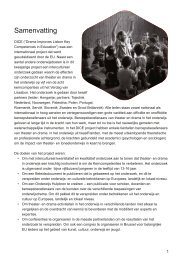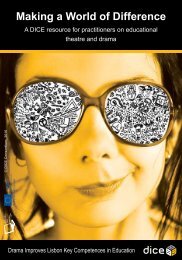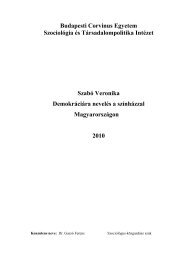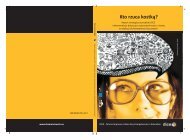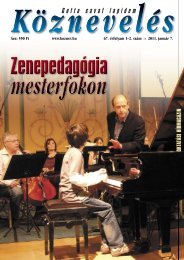Policy Paper - Drama Improves Lisbon Key Competences in Education
Policy Paper - Drama Improves Lisbon Key Competences in Education
Policy Paper - Drama Improves Lisbon Key Competences in Education
You also want an ePaper? Increase the reach of your titles
YUMPU automatically turns print PDFs into web optimized ePapers that Google loves.
“ “<br />
Learn<strong>in</strong>g through drama how to help people<br />
with troubles was really great.”<br />
Špela, 14 year-old student, Slovenia<br />
To sum up, students who regularly participate <strong>in</strong> educational theatre and drama activities<br />
are more empathic: they show concern for others and they are more able to change their<br />
perspective. They are better <strong>in</strong> problem-solv<strong>in</strong>g and cop<strong>in</strong>g with stress. They are more<br />
likely to be a central character <strong>in</strong> the class. They are very significantly more tolerant<br />
towards both m<strong>in</strong>orities and foreigners, and they are much more active citizens: they<br />
show more <strong>in</strong>terest <strong>in</strong> vot<strong>in</strong>g or participat<strong>in</strong>g <strong>in</strong> public matters.<br />
Spirituality, universality means to be smarter and<br />
better educated <strong>in</strong> every sense. More tolerant to<br />
attitudes, op<strong>in</strong>ions, cultures different from one’s<br />
own. The most important, however, is socialis<strong>in</strong>g<br />
with the circle of people striv<strong>in</strong>g for the same goals,<br />
and to th<strong>in</strong>k and have fun <strong>in</strong> the same way."<br />
Filip Hadžić,15 year-old Serbian student<br />
Another illustrative chart shows how <strong>in</strong>terest <strong>in</strong> active participation changes when<br />
research and control groups are compared.<br />
0.58<br />
R e s u l t s<br />
The follow<strong>in</strong>g chart is a vivid illustration of how the social acceptance of the out-group<br />
changes <strong>in</strong> the research group and <strong>in</strong> the control group.<br />
average score on a scale of 1-5<br />
3.25<br />
3.00<br />
2.75<br />
2.50<br />
2.25<br />
<strong>in</strong>put<br />
“<br />
control<br />
research<br />
output<br />
Chart 13. Differences between the<br />
cont<strong>in</strong>uous research group (who<br />
have participated <strong>in</strong> educational<br />
theatre and drama activities) and<br />
the control group (who have not)<br />
<strong>in</strong> the acceptance of the out-group<br />
(the least accepted nationality or<br />
m<strong>in</strong>ority <strong>in</strong> the country).<br />
To be honest what I saw was very amus<strong>in</strong>g. My daughter<br />
used to tell me constantly about her day and what she<br />
does because she was with you [TDP] for a long time. I<br />
noticed a lot of changes <strong>in</strong> her. She’s quieter now, she<br />
loves study<strong>in</strong>g, discusses th<strong>in</strong>gs with me, wakes up<br />
early, and helps her sisters with their homework and<br />
expla<strong>in</strong>s to them what to do."<br />
Mother of Arzak, Palest<strong>in</strong>e<br />
average score on a scale of 1-5<br />
0.57<br />
0.56<br />
0.55<br />
0.54<br />
0.53<br />
control<br />
research<br />
<strong>in</strong>put<br />
output<br />
“<br />
Empathy, tolerance, pay<strong>in</strong>g attention to<br />
each other, understand<strong>in</strong>g their behaviour,<br />
<strong>in</strong>dependent decision-mak<strong>in</strong>g."<br />
Answer of the teacher from Bakáts Téri<br />
Primary School (Budapest, Hungary) to<br />
the question: What have the children<br />
learnt and what skills have improved<br />
through the drama programme?<br />
Chart 14. Differences between<br />
the research group (who have<br />
participated <strong>in</strong> educational<br />
theatre and drama activities)<br />
and the control group (who have<br />
not) <strong>in</strong> attitudes towards active<br />
participation.<br />
R e s u l t s<br />
44<br />
45


